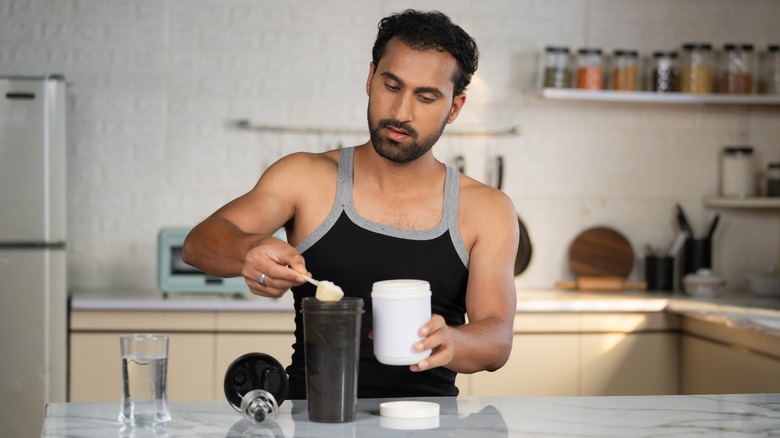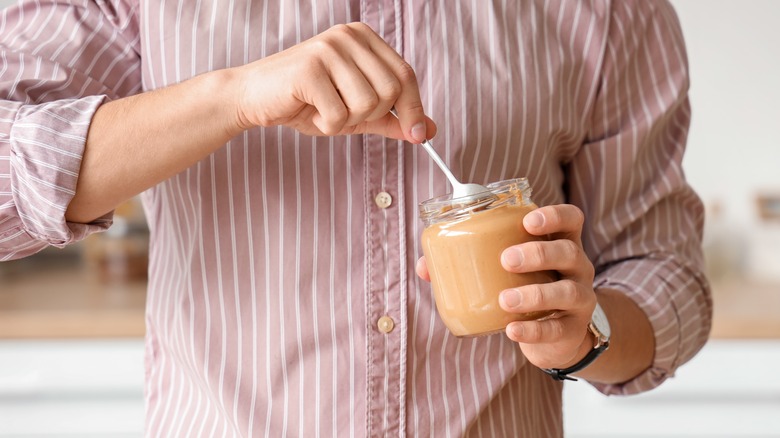Powdered Peanut Butter Isn't As Healthy As You Thought
Do you go bananas for the taste of roasted peanuts? Is it hard to resist eating spoonfuls of your favorite peanut butter straight from the jar? You've probably considered switching to powdered peanut butter to curb your cravings. For many peanut butter lovers, powdered peanut butter is a decent swap for the real thing, in part because it's made from real peanuts. The only issue? Powdered peanut butter isn't always as healthy as you might expect.
The problem isn't how powdered peanut butter is created, though. Powdered peanut butter is nothing more than roasted peanuts that undergo intense compression to squeeze out as much fat as possible. In fact, pressing takes out up to 85% of the natural oils in the peanuts, according to Healthline reporting. The pressed peanuts are then ground and prepared into a powder substance that offers a mild to moderate peanut taste but is less caloric than regular peanut butter due to its reduced fat content.
In fact, nutritional data from the U.S. Department of Agriculture (USDA) reveal that one tablespoon of peanut butter contains about 95 calories and 8 grams of fat. In comparison, analysis from Consumer Reports shows that one tablespoon of powdered peanut butter contains only 25 calories and 1 gram of fat — noticeably less.
Is it any wonder that powdered peanut butter has become a go-to favorite among people seeking a lower-calorie and lower-fat version of peanut butter? Nope. But not all powdered peanut butters contain just pressed peanuts.
Richer flavors courtesy of sweeteners and salt
Many manufacturers and brands augment their powdered peanut butters with sugars and salt, among other additives. The goal is to kick up the flavor, but all those add-ins can reduce the overall healthiness of the product, especially if you want to eat a "clean" diet that favors whole foods.
Just how much sugar can be hiding in a powdered peanut butter product? It's not necessarily a lot, but it may be more than you thought you were getting. For instance, research from the University of Wyoming indicates that powdered peanut butter offers up one gram of sugar in a two-tablespoon serving. Not outrageous. However, even an extra gram of sugar can be too much. For instance, if you're monitoring sugar to ward off preventable problems like the development of liver disease, which may be linked to sugar consumption (according to a 2018 study from the Journal of Hepatology), you may want to avoid eating foods with added sugars.
In terms of salt, the average powdered peanut butter brings along about 94 mg per serving. Again, not terrible, given that the U.S. Food and Drug Administration (FDA) allows up to 2,300 mg daily for adults who are otherwise healthy and want to follow a normal diet. Nevertheless, any amount of excess salt may be more than you'd like. As the American Heart Association notes, overdoing your salt intake can raise your risk of high blood pressure, an enlarged heart, osteoporosis, and kidney disease.
Regular versus powdered peanut butter
Should you move to powdered peanut butter or keep eating the real thing? A good way to decide is to determine what matters most to you.
For example, maybe you've always turned to peanut butter to curb your appetite and help you beat back boredom snacking. You've made a good choice. A 2014 study published in the American Journal of Clinical Nutrition concluded that nut intake may help keep hunger at bay. Why? One reason was the fat content found in nuts. Some fatty foods, including peanuts, take longer to digest. Therefore, if you're interested in satiety, powdered peanut butter might not be the right fit. Though powdered peanut butter is low in calories, it lacks fat.
On the other hand, perhaps you're trying to reduce the number of calories you eat. If cutting calories is critical to you, turning to powered peanut butter may enable you to fulfill your peanut butter cravings without overindulging. Just be sure to opt for a powdered peanut butter without added sugars. The fewer sugars, the fewer calories each scoop will contain. What if you're worried about overdoing your salt? Either unsalted peanut butter or unsalted powdered peanut butter could work.
Like many foods, powdered peanut butter can have a place in your kitchen. However, it might not be exactly right for everyday eating if it doesn't align with your healthy lifestyle goals.


